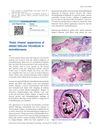 February 2021 in “Cureus”
February 2021 in “Cureus” A woman's hair loss was initially misdiagnosed as scarring hair loss but was actually a treatable autoimmune hair loss.
July 2019 in “Dermatology practical & conceptual” The study found that alopecia areata is strongly linked to autoimmune diseases and may indicate a genetic predisposition to such conditions.
[object Object] January 2016 in “Indian dermatology online journal” The patient has frontal fibrosing alopecia (FFA).
 January 2015 in “Indian Dermatology Online Journal”
January 2015 in “Indian Dermatology Online Journal” The patient's hair loss is most likely due to diffuse alopecia areata.
37 citations,
December 2021 in “Cells” Alopecia areata severity and treatment response are linked to specific cytokine levels.
37 citations,
September 2012 in “Archives of dermatology” Diphencyprone can help some children with alopecia areata regrow hair, but it often causes side effects.
35 citations,
October 2017 in “JAMA dermatology” Children with alopecia areata should only have thyroid screening if they have Down syndrome, a history of atopy, family history of thyroid disease, or signs of thyroid problems.
26 citations,
September 2013 in “Journal of Dermatological Science” Serum granulysin levels can indicate the activity and prognosis of alopecia areata.
 24 citations,
January 2018 in “International Journal of Trichology”
24 citations,
January 2018 in “International Journal of Trichology” Tofacitinib helped regrow hair in patients with alopecia, with few side effects.
19 citations,
January 2021 in “Journal of the American Academy of Dermatology” Dupilumab may help children with alopecia areata and atopic dermatitis regrow hair.
 19 citations,
October 2020 in “Journal der Deutschen Dermatologischen Gesellschaft”
19 citations,
October 2020 in “Journal der Deutschen Dermatologischen Gesellschaft” Hair loss can lead to significant stigma and lower quality of life, especially for women and those with certain types of alopecia.
14 citations,
April 2017 in “Dermatology practical & conceptual” Yellow dots are common in severe alopecia areata.
13 citations,
January 2017 in “Annals of dermatology/Annals of Dermatology” Simvastatin/ezetimibe may help some patients with severe alopecia areata regrow hair.
 11 citations,
January 2020 in “Dermatologica Sinica”
11 citations,
January 2020 in “Dermatologica Sinica” Tofacitinib helps regrow hair in severe alopecia patients, but more research is needed.
9 citations,
January 2013 in “Indian journal of dermatology, venereology, and leprology” Infliximab may cause hair loss in Crohn's disease patients.
[object Object] 8 citations,
January 2013 in “International journal of trichology” Two people had unusual ring-shaped hair loss due to an autoimmune disorder.
 6 citations,
February 2021 in “Advances in Clinical and Experimental Medicine”
6 citations,
February 2021 in “Advances in Clinical and Experimental Medicine” Wharton's jelly-derived stem cells were safely used to treat four alopecia patients, resulting in hair regrowth in all of them.
6 citations,
April 2020 in “Cureus” Platelet-rich plasma injections can effectively treat alopecia areata barbae.
 4 citations,
January 2023 in “Frontiers in Immunology”
4 citations,
January 2023 in “Frontiers in Immunology” Shorter telomeres in white blood cells may increase the risk of a common type of hair loss.
 4 citations,
October 2022 in “Genes”
4 citations,
October 2022 in “Genes” Our microbiome may affect the development of the hair loss condition Alopecia Areata, but more research is needed to understand this relationship.
 3 citations,
March 2023 in “JAAD case reports”
3 citations,
March 2023 in “JAAD case reports” Upadacitinib cleared scalp alopecia areata in three patients and also improved atopic dermatitis with minimal side effects.
3 citations,
January 2018 in “Skin Appendage Disorders” Nail issues are common in alopecia areata patients.
 3 citations,
July 2012 in “British journal of hospital medicine”
3 citations,
July 2012 in “British journal of hospital medicine” The guide helps clinicians diagnose and manage hair loss, detailing examination techniques and treatments for different types of alopecia.
 2 citations,
April 2023 in “JEADV. Journal of the European Academy of Dermatology and Venereology/Journal of the European Academy of Dermatology and Venereology”
2 citations,
April 2023 in “JEADV. Journal of the European Academy of Dermatology and Venereology/Journal of the European Academy of Dermatology and Venereology” JAK-inhibitors for alopecia areata are generally safe with mostly mild side effects and a low rate of treatment withdrawal.
 1 citations,
March 2023 in “Clinical, Cosmetic and Investigational Dermatology”
1 citations,
March 2023 in “Clinical, Cosmetic and Investigational Dermatology” Current treatments for Alopecia Areata have mixed success, and there's a need for better, more accessible options and support for affected individuals.
 1 citations,
September 2021 in “CRC Press eBooks”
1 citations,
September 2021 in “CRC Press eBooks” Frontal Fibrosing Alopecia is a hair loss condition mainly affecting postmenopausal women, with unclear causes and various clinical patterns.
 1 citations,
January 2014 in “Indian Journal of Dermatology, Venereology and Leprology”
1 citations,
January 2014 in “Indian Journal of Dermatology, Venereology and Leprology” The 'Swiss cheese' pattern in scalp biopsies can indicate trichotillomania, not just alopecia areata.
 November 2024 in “Health Science Reports”
November 2024 in “Health Science Reports” Light/laser therapy can effectively increase hair density in some types of alopecia, especially androgenic alopecia and alopecia areata.
 August 2024 in “Frontiers in Public Health”
August 2024 in “Frontiers in Public Health” Alopecia Areata severely impacts mental health, causing anxiety and depression, affecting quality of life.

Higher levels of β-carotene and vitamin E may help prevent certain types of hair loss.

















